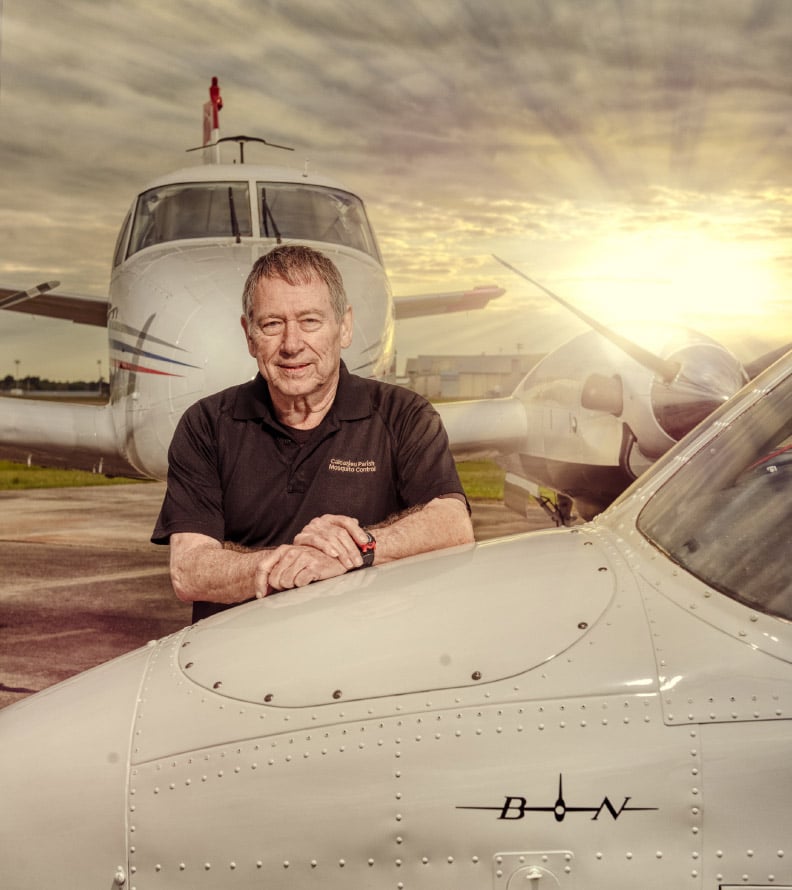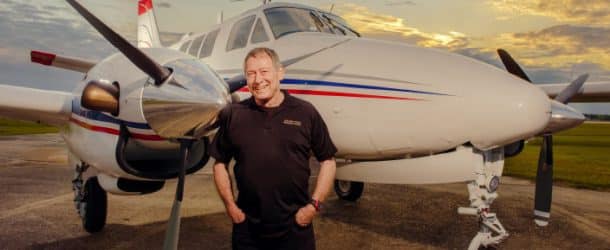After 52 Years As A Pilot, Reagan Cook’s Career Has Been Cleared For Landing
Story By Pamela S. Thibodeaux • Photos By Lindsey Janies
If you don’t believe some things are simply meant to be, then a single conversation with Reagan Cook would convince you, as it has me. There’s no doubt Cook was born to fly.
Cook’s exposure to airplanes stemmed from his father, Charles, who partnered with Doug McMillen to buy an airplane around 1948. The elder Cook bought out McMillen’s share of two planes before McMillen decided to open his own airport, McMillen Air Park, now known as Lake Charles Regional Airport.
Reagan Cook wasn’t one of those young boys who dreamed of flying, lived to watch Sky King and Penny on Saturday mornings or played with model airplanes. He says he never consciously chose to be a pilot, although he did query an airline to see what it took to fly for them before entering the Army in 1963, serving as an electrical instrument repairman for three years at a chemical warfare testing area in the Utah desert. Upon his discharge, Cook took advantage of the GI bill and began flight training and working on getting his pilot license while working in construction as a pipefitter and welder.

“This is not a job for just anybody,” Cook admits. “And it’s hard to find pilots to take it on.”
Photo By Lindsey Janies
Cook has now accumulated over 24,000 flight hours over 52 years as a pilot. He is FAA certified in single- and multi-engine airplanes and is an instrument flight instructor.
“I may not be the best pilot in the world but what I have learned is how to keep you alive,” he says of his 48 years as an instructor. He has trained 95 percent of Cameron and Calcasieu Parish Mosquito Control pilots since 1977, none of whom have been involved in an accident.
Cook has been with Cameron Parish Mosquito Control for 43 years and Calcasieu Parish Mosquito Control since its inception in 1975. He has also flown for Vermilion Parish and other parishes that don’t have airplanes.
A short chat with Calcasieu Parish mosquito and rodent control director Scott Willis revealed the department’s mission is to “enhance public health and the quality of life through the suppression of mosquitoes for the citizens of Calcasieu Parish.”
Willis says he remembers flying with Cook in the early days, recalling that Cook would say, “See that string of lights? That’s Choupique Road in Carlyss.”
“Cook visually knew and used land marks to spray areas at night,” Willis said. “Now they have GPS technology to bring pilots and airplanes to exact locations.”
Though the whole process sounds complicated, what Mosquito Control really does is build a barrier out in the marshes so that most mosquitoes don’t make it into town. Many mosquitos live, breed and hatch in outlying marshy areas, where dense mosquito populations and wind often make spraying with trucks ineffective.
Not every parish can afford an airplane to spray for mosquitoes. Sometimes it is cheaper to hire companies with airplanes to spray when needed than to buy and maintain a plane and pay full-time pilots and mechanics. Air mosquito control is a tax-funded program, and Cook says, “Thank God for taxpayers.”
Cook’s early stints as a crop duster and his commercial flying experience, first with the Henning family (Cameron Telephone) for about eight years, then with Steve Jordan (Central Crude) and his family for five years, prepared him for his work with mosquito control. “I had all the tools to come in at night and do this job because if something goes wrong in the dark, you have to have your other training to fall back on.”
Early in his mosquito control career, while also flying his commercial flights, Cook’s mosquito sprays were often scheduled so closely to his commercial flights that he didn’t have time to change from the formal attire (jacket and tie) required of his commercial job to a more relaxed wardrobe for his mosquito sprays. “Flying over the dark Cameron marsh at 2 am, I assumed I just might be the best dressed man in the marsh,” he says with a chuckle.
“This is not a job for just anybody,” Cook admits. “And it’s hard to find pilots to take it on.” In fact, it has taken Cook 15 years to find the pilot who will one day take his place with Cameron Parish Mosquito Control.
“Many may fly low altitudes during the day or really high at night, but when you’re flying over rooftops at 300 feet, there’s a lot of scary things down there that can hurt you.”
One of the scariest and most dangerous obstructions encountered when flying at night is an unlit tower. Most towers are listed in a national database and show up on their grids, but sometimes you look up and it’s just there.
“The golden rule to flying at night,” Cook says, “is to never fly over a tower. Fly around it, because the light you’re seeing may not be the top, but a middle or lower light.” He tells the story of one pilot who, while in a dive after a huge, climbing turn, made the mistake of flying ‘over’ a tower. The light he saw was actually the middle light. The pilot hit the tower and lost over 6 feet of wing, but still managed to make it home alive. A miracle in my mind.
Along with the dangers of flying so low, there’s the terrain. There are pilots who say they don’t like flying over the marshes during the day, and they’re certainly not going to do so at night.
Why spray at night? Mosquito control flights usually start 30 minutes after sundown, because there are less people out and about, mosquitos are more active at night, and because the insecticide is detrimental to honeybees, so they have to wait until the bees have all gone in before spraying. Those chemicals that help to control and limit approximately 60 species of mosquitoes in Louisiana, however, have no residual effects on humans.
I asked Cook what advice he’d give to a young person who wants to fly. “Go out and take a few lessons and if possible go on an orientation flight,” he says. This will help you decide if you like flying or not. If you do, he suggests getting your license and starting small to build up flight hours and experience, since airlines have minimum flight requirements for employment. For those who may not care to fly but love airplanes, there is a huge need for airframe and powerplant mechanics.
Cook also encourages instructors and pilots that give orientation rides to handle their students with kid gloves because if you scare the student, it’s over, and that may be the next great pilot sitting next to you.
Despite the risks, Cook loves the excitement of his job. When asked if he feels as if he’s touching the face of God while flying, Cook just laughed and said, “only when something scary happens,” but admitted he’s been very fortunate because the job is dangerous and you have to be aware at all times. But once you become familiar and ‘at home’ in the position, it’s like any other job. You know your limitations and you have faith and trust in yourself and your abilities.
When asked about retirement and what he meant, by “soon,” Cook laughed and said he’s afraid he’ll desperately miss flying. “But,” he added, “Clint Eastwood said, ‘a man’s got to know his limitations.’” At 76, Cook says he can feel his age catching up to him, so he probably won’t work much longer, although he will continue to train pilots as long as he is able and needed. As for what he’ll do after retiring, Cook, a husband and father, wants to spend more time with his family, work in his yard and travel to Knave, Utah where they used to film old Western movies.
Despite his exemplary record, Cook, whom I would deem the “Top Gun of Mosquito Control in SWLA,” doesn’t have a conceited bone in his body, nor was there a hint of arrogance in his tone as we chatted, only a love of flying and a passion for what he does.
My conversation with this humble man who has a twinkle in his eye, a great smile and an infectious laugh was an education in all that Calcasieu and Cameron Parishes do to protect us from mosquito-borne illnesses and disease. I salute you all and say, “Thank You and God bless!”















Comments are closed.